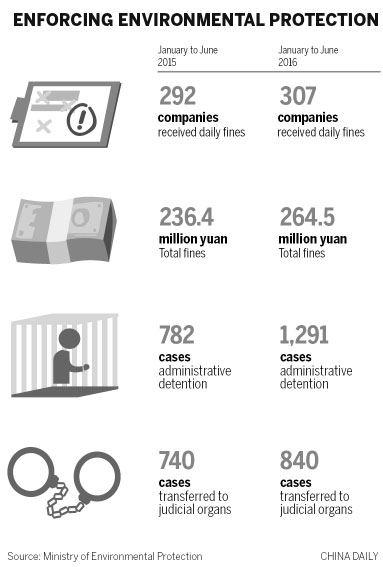Revised law proves effective for enforcement, serves as deterrent against would-be violators
China flexed its muscles in the first six months of the year, punishing more polluters with the stronger tools available in the revised Environmental Protection Law.
The new tools include levying daily fines, closing production facilities, suspending operations and transferring parties to judicial organs.
More than 300 companies were given daily fines due to pollution, the Ministry of Environmental Protection said.
In addition, 1,291 cases were transferred to administrative detention for up to 15 days, an increase of 65 percent year-on-year, it said.
Another 840 cases were transferred to judicial organs for further investigation.
Tian Weiyong, head of environmental supervision under the ministry, said, "The strong punishments have reduced pollution effectively, and bureaus nationwide will continue to implement the law to protect the environment in the second half of the year."
In addition to the strict reins on companies discharging pollutants, environmental protection authorities have targeted projects under construction, reviewing their environmental impact assessments and other necessary documents to control pollution at its source.
By the end of July, authorities had exposed 624,000 projects violating laws and regulations, among which over 72,000 projects were required to shut down or stop construction, the statement said.
The revised law has worked well in punishing polluters and deterring other companies since its implementation in January last year, with an effective improvement in the environment and satisfaction from the public, according to an assessment report from China University of Political Science and Law in March.
"Environmental authorities have gradually taken better advantage of the stronger tools presented by the law, and also given the law teeth," said Wang Canfa, a professor in environmental law at the university and a lead writer of the assessment report.
Wang said that 85 percent of the companies that were punished stopped polluting, and in some areas 95 percent of the companies corrected their behaviors.
He suggested authorities hire more inspectors to fully implement the revised law, which could greatly reduce pollution.



















































